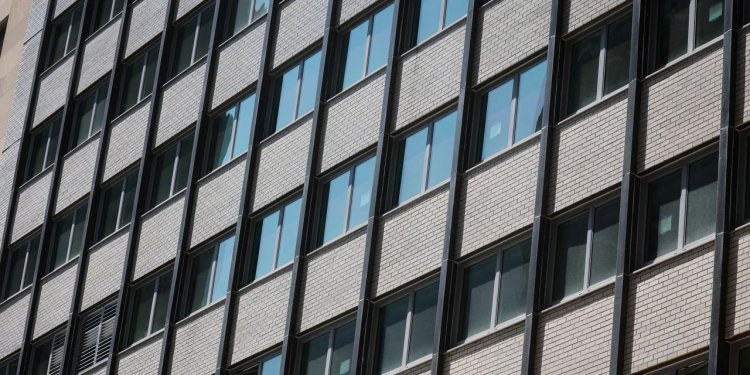Wall Street Is Ready to Scoop Up Commercial Real Estate on the Cheap
Firms are raising billions of dollars for funds to target assets with slumping values Vacancy rates in the office market have soared amid a sluggish return-to-the-office pace. BRENDAN MCDERMID/REUTERS BRENDAN MCDERMID/REUTERS By Peter Grant Updated Aug. 15, 2023 12:00 am ET Wall Street firms are raising new funds to acquire office buildings, apartments and other troubled commercial real estate, looking to scoop up properties at a fraction of the price investors paid a few years ago. Cohen & Steers, Goldman Sachs, EQT Exeter and BGO, formerly known as BentallGreenOak, are among the prominent names raising billions of dollars for funds to target distressed assets


Wall Street firms are raising new funds to acquire office buildings, apartments and other troubled commercial real estate, looking to scoop up properties at a fraction of the price investors paid a few years ago.
Cohen & Steers, Goldman Sachs, EQT Exeter and BGO, formerly known as BentallGreenOak, are among the prominent names raising billions of dollars for funds to target distressed assets and other real estate with slumping values, according to regulatory filings.
“The last few weeks, I’ve been saying, ‘holy mackerel, they’re coming out of the woodwork,’” said Kevin Gannon, chief executive of Robert A. Stanger & Co., an investment-banking firm that tracks real-estate fundraising.
With housing in short supply, developers are converting more empty offices into apartments. But not all buildings are candidates for reuse, even as more than one billion square feet of office space sits vacant across the U.S. Photo Illustration: Amber Bragdon
The new funds are seeking to capitalize on one of the most troubled commercial-property markets in decades. Values have nosedived since interest rates spiked last year, driving up borrowing costs in the highly leveraged business. The office market, one of the largest sectors, has also been clobbered by a sluggish return-to-office rate, which has sent vacancy rates soaring. Apartment buildings, an investor haven in the past, look vulnerable as owners try to refinance at much higher rates. Mall owners are contending with steep value declines, some of more than 70% over the past few years.
Commercial-property sales have been moribund until recently because most sellers haven’t been willing to cut their prices to the levels that buyers are demanding. Now, a small but growing number of office owners have begun to capitulate, unloading distressed properties.
The capitulation marks a new phase in the commercial real-estate upheaval, as more beleaguered property owners turn over properties to lenders or decide to take what they can get, rather than hold out hope for an eventual recovery. This wave of fundraising is the latest sign that sales activity is expected to increase as more sellers yield on price.

Developer Presidio Bay purchased a San Francisco office tower for $41 million, compared with its 2014 sales price of $107 million.
Photo: Jeff Peters
In one recent example, the owner of a downtown San Francisco office tower unloaded the property for $41 million to developer Presidio Bay. The seller, Clarion Partners, had purchased the property for $107 million in 2014.
While the clearest distress is in the office sector, many property owners with floating-rate debt may also feel pressured to sell at marked-down prices because they are unable to refinance at today’s higher rates. In addition, fund managers expect values to fall as regional banks, under pressure from this year’s rash of bank failures, unload commercial-property loan portfolios at discounted prices.
“There are selective opportunities beginning to arise for investors that are in a position to take advantage of weakness,” said Rich Hill,
head of real-estate strategy for Cohen & Steers, which is aiming to raise more than $2.5 billion in a new nontraded real-estate investment trust.Commercial-property values already have fallen about 10 to 15 percentage points from their peaks in the third quarter last year, and might fall a total of 20 to 25 percentage points, said Hill. “You have to go back to the [savings and loan] crisis and the global financial crisis to see such big declines in property valuations,” he said.
The volume of distressed commercial real estate grew by $8 billion in the second quarter, reflecting the rise in cases where the owners defaulted or lenders foreclosed, according to data provider MSCI Real Assets. That is the biggest quarterly increase since the second quarter of 2020.
While most of the new funds are looking to buy property, some are planning to lend to property owners and fill the void left by the cutback in activity from regional banks and mortgage real-estate investment trusts. With less competition, the lenders who are still active are able to charge higher rates and get better deal terms from borrowers.
Invesco Real Estate, which has a long track record of raising funds from institutional investors for real-estate credit funds, is raising its first such fund targeting the retail audience.
SHARE YOUR THOUGHTS
Is commercial real estate undervalued right now? Why or why not? Join the conversation below.
Many of the new funds, such as those being raised by Invesco and Cohen & Steers, are targeting individual investors. Smaller investors have shown an enormous appetite for property investments in recent years, especially with the growth of the nontraded real-estate investment trust industry which raised about $100 billion in the past seven years.
But many of the nontraded REITs that were formed before last year’s rise in interest rates have been under pressure to redeem money back to investors who want to cash out. Over $9 billion was redeemed in the first six months of this year, according to Stanger, and many investors have been forced to wait to get their money because of the rush to the redemption door.
Still, the new funds will be facing a lot of competition from cash-rich funds aimed at institutions. Opportunistic real-estate funds run by private-equity firms have nearly $145 billion in so-called dry powder for future investments, up from $120 billion at the end of last year, according to data firm Preqin.
It is still possible that distressed opportunities won’t arise if the U.S. economy has a soft landing, in which inflation is tamed by the Federal Reserve without tipping the economy into recession.
Sales volume will likely increase when debt markets stabilize and values become more clear. “Broadly speaking, people are waiting to see what the world looks like,” said Michael Stark, co-head of the PJT Park Hill Real Estate Group, a global advisory firm and placement agent. “They’re waiting for motivated sellers.”
Write to Peter Grant at [email protected]
What's Your Reaction?













